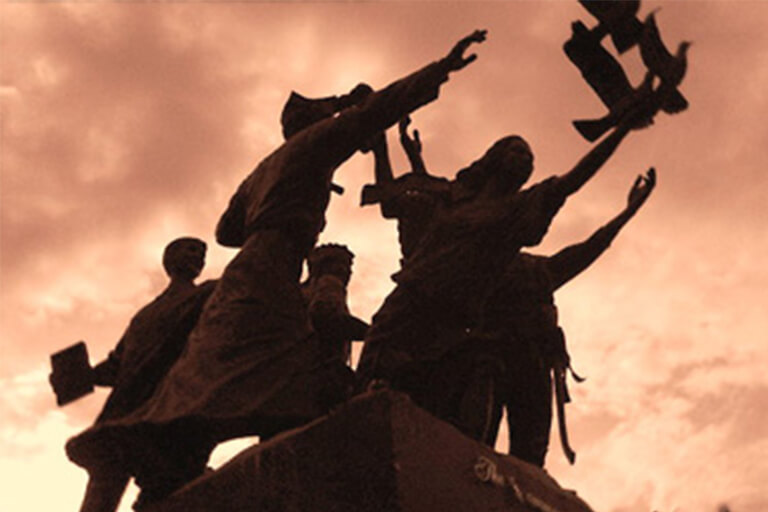Muslim Voices — Mindanao

Audio transcript:
0:00:06:>>ROSEMARY PENNINGTON: Welcome to Muslim Voices. I'm Rosemary Pennington sitting in for Manaf Bashir this week.
0:00:11:(SOUNDBITE OF MUSIC)
0:00:12:>>ROSEMARY PENNINGTON: For decades, a conflicts been raging between the government of the Philippines and the Moro Islamic Liberation Front or MILF. The two are at odds over the Island of Mindanao. The MILF went self-rule for the region and came close to getting a form of autonomy in August. But the Philippine Supreme Court ruled the agreement unconstitutional. Now, the two sides are at an impasse and acts of violence continue. The conflict over Mindanao is often framed as a religious one, as Muslim versus Christian. Indiana University doctoral candidate, Rafia Zakaria is a Muslim and recently traveled to the Philippines. She says the conflict is about more than just religion.
0:00:56:>>RAFIA ZAKARIA: This is not really a Muslim problem. I mean, it is more an issue of Indigenous peoples and their rights. And initially, the people of Mindanao were represented by the Moral National Liberation Front which was a secular group. As time has passed, the fact that there is a religious difference, you know, the people of Mindanao are Muslim as opposed to the Catholic, Filipino population, that has kind of led to a hardening of religious identity and then more, the people of Mindanao have kind of coalesced around the Moro Islamic Liberation Front which is now, you know, again, the major party that is negotiating with the government.
0:01:38:>>ROSEMARY PENNINGTON: Now, you said as part of this tour you went on, that you spoke with some leaders of the Moro, the Moro groups in Mindanao. What are they hoping happens between then and now? Because that's, you know, a good year from now and it seems like just sitting on this doesn't serve anyone's purpose.
0:01:58:>>RAFIA ZAKARIA: There's a couple of problems. The first problem is that for the MOAD to actually be implemented, there has to be a constitutional amendment. The constitutional amendment politically at this point is problematic because their current President, Arroyo, wants to also amend the constitution to allow another term for herself. So if the MILF gets on the bandwagon with that, then it becomes politically attached to having extended or having helped extend the term of a president who is unpopular in the Philippines. So that's kind of the political conundrum that the MILF finds itself in right now and that's why there's, you know, a lot of talk that to just wait till a new administration to take this on.
0:02:46:>>ROSEMARY PENNINGTON: You mentioned that you're reading these reports that there were two blasts in a Christian area and whether that ends up being something the MILF has done or not, it's still going to be associated with them. I mean, what are those leaders doing to curb that violence?
0:03:01:>>RAFIA ZAKARIA: It's a question that we asked them also is that are you actually in control of all factions within the MILF? And, you know, if you ask them to their face they say yes, we are in control of the MILF. And there's actually some procedure that's worked out between the MILF and the government where if there is an instance like this, the MILF has to be given the kind of autonomy to find these people and carry out their own investigation against them. So their gripe with the government is that when something like this happens, that those procedures aren't followed and the government ends up going after whoever themselves, which undermines the MILF and then, you know, reduces their control over their faction. So every part of it essentially then becomes, you know, this kind of bargaining chip I think or bargaining issue between the government and the MILF. Obviously, there aren't any reports of who actually is behind these blasts but, you know, they did take place in Mindanao. They did take place in a Christian area, you know, during the Christmas shopping season. So, you know, you can obviously kind of make some kind of calculated guesses and, you know, incidents like these happen even while we were there. And it's terrible because there is a huge, again, majority of Mindanao Muslims who are working so hard to kind of improve dialogue and to have interfaith dialogue and to speak to, you know, we talked to, for example, to this one youth group which had Lumads and Catholics from the north and, you know, Muslims from Mindanao, were working so hard on university campuses to kind of keep this dialogue going and, you know, kind of fight this dehumanization. And then when something like this happens, I mean, you know, it's something, again, as terrorist attacks go, very easy to do for a very small number of people and that kind of washes over the work that so many others are doing to kind of find a workable solution. So I feel terrible for them. I feel terrible, you know, for those young university students that are literally putting their lives out, you know, trying to have this dialogue.
0:05:15:(SOUNDBITE OF MUSIC)
0:05:21:>>ROSEMARY PENNINGTON: Rafia Zakaria is a political science doctoral candidate at Indiana University. She recently traveled with a group to the Philippines to help promote interfaith dialogue in Mindanao. This has been Muslim Voices, a production of voices and visions in partnership with WFIU public media from Indiana University. Support for Muslim Voices comes from the Social Science Research Council. You can subscribe to our podcasts in iTunes or join the discussion on our website. Find us online at muslimvoices.org.


 IU Global
IU Global